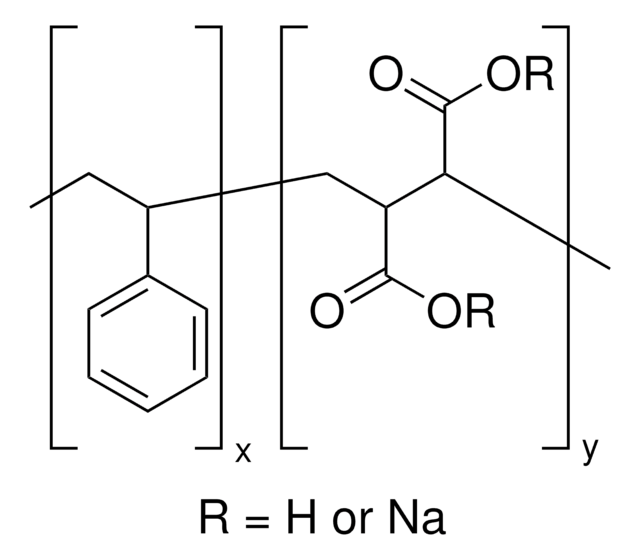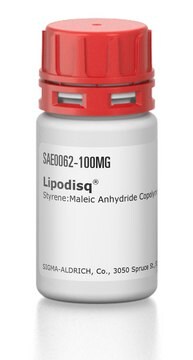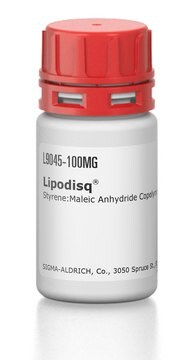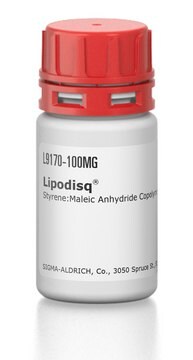L8920
Lipodisq®
Styrene:Maleic Anhydride Copolymer 2:1
Anmeldenzur Ansicht organisationsspezifischer und vertraglich vereinbarter Preise
Alle Fotos(1)
About This Item
UNSPSC-Code:
12352202
NACRES:
NA.25
Empfohlene Produkte
Biologische Quelle
synthetic
Form
powder
Lagertemp.
room temp
Suchen Sie nach ähnlichen Produkten? Aufrufen Leitfaden zum Produktvergleich
Anwendung
Lipodisq® has been used in nanoparticle preparation along with palmitoyloleoylphosphatidylcholine (POPC) and palmitoyloleoyl phosphatidylglycerol (POPG).
Lipodisq® reagents are novel polymers derived from styrene and maleic acid. Lipodisq polymers are capable of forming nanosized lipid-based discoidal particles capable of incorporating membrane proteins. The Lipodisq technology can solubilize commonly used lipids such as dimyristoylphosphatidylcholine (DMPC) without the use of detergents. In general, Lipodisq polymers are potentially useful in mitigating the use of detergents for the solubilization of membrane proteins. Lipodisqs typically have a diameter of 9-10 nm at pH 7.4.
Biochem./physiol. Wirkung
Lipodisq® is detergent-free and is useful in membrane protein biophysical studies including electron microscopy (EM), circular dichroism (CD), electron paramagnetic resonance (EPR) and nuclear magnetic resonance (NMR) techniques as well as delivery vehicle.
Rechtliche Hinweise
Lipodisq is a registered trademark of Malvern Cosmeceutics Limited
Ähnliches Produkt
Produkt-Nr.
Beschreibung
Preisangaben
Lagerklassenschlüssel
11 - Combustible Solids
WGK
WGK 3
Flammpunkt (°F)
Not applicable
Flammpunkt (°C)
Not applicable
Analysenzertifikate (COA)
Suchen Sie nach Analysenzertifikate (COA), indem Sie die Lot-/Chargennummer des Produkts eingeben. Lot- und Chargennummern sind auf dem Produktetikett hinter den Wörtern ‘Lot’ oder ‘Batch’ (Lot oder Charge) zu finden.
Besitzen Sie dieses Produkt bereits?
In der Dokumentenbibliothek finden Sie die Dokumentation zu den Produkten, die Sie kürzlich erworben haben.
Juan Francisco Bada Juarez et al.
Biochimica et biophysica acta. Biomembranes, 1862(3), 183152-183152 (2019-12-18)
Dopamine receptors (DRs) are class A G-Protein Coupled Receptors (GPCRs) prevalent in the central nervous system (CNS). These receptors mediate physiological functions ranging from voluntary movement and reward recognition to hormonal regulation and hypertension. Drugs targeting dopaminergic neurotransmission have been
Juan Francisco Bada Juarez et al.
Chemistry and physics of lipids, 221, 167-175 (2019-04-04)
Nanoparticles assembled with poly(styrene-maleic acid) copolymers, identified in the literature as Lipodisq, SMALPs or Native Nanodisc, are routinely used as membrane mimetics to stabilise protein structures in their native conformation. To date, transmembrane proteins of varying complexity (up to 8
Unser Team von Wissenschaftlern verfügt über Erfahrung in allen Forschungsbereichen einschließlich Life Science, Materialwissenschaften, chemischer Synthese, Chromatographie, Analytik und vielen mehr..
Setzen Sie sich mit dem technischen Dienst in Verbindung.








